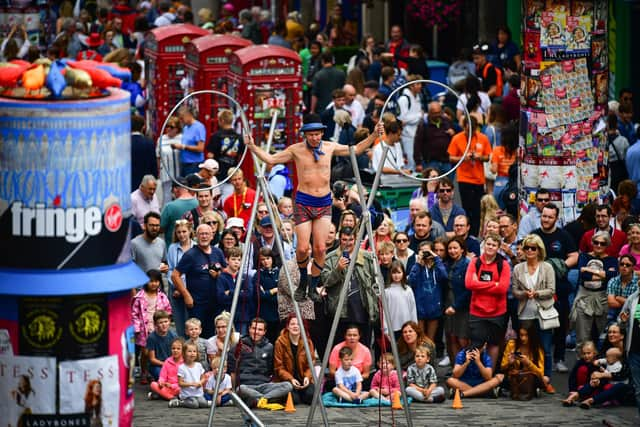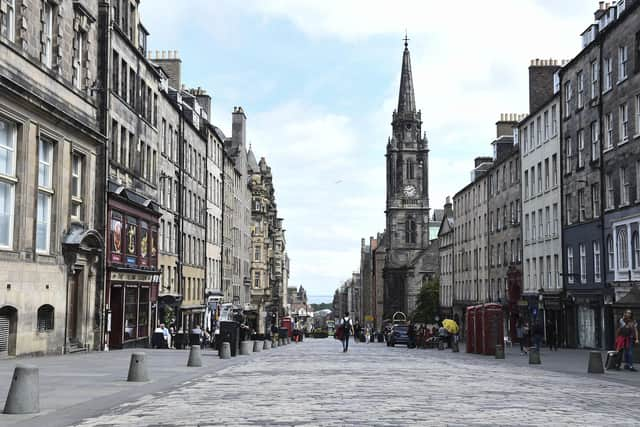Fringe organisers lay off one in three staff amid warnings of 'precarious' finances and future
and live on Freeview channel 276
The Scottish Parliament has been warned that the festival’s “world-leading status” is under increasing threat without a major injection of public funding to help it recover from the impact of the coronavirus pandemic.
The charity overseeing the festival, which is due to celebrate its 75th anniversary in 2022, has raised the alarm with MSPs about its “precarious financial situation and future” and warned that it could take at least three years for a recovery to be staged.
Advertisement
Hide AdAdvertisement
Hide AdThe Fringe Society has admitted its financial “fragility” has been exposed and that it would need to change its business model in future. It has previously relied on income generated from its official programme and box office sales.
Chief executive Shona McCarthy has previously revealed how the charity was taken to the brink of insolvency by the enforced cancellation of last year’s Fringe and the refunding of registration fees for hundreds of shows.
The society has already “stripped back” its normal services after reduced staff numbers by a third, to 24, to try to weather a financial storm.
MSPs have been told that recovery plans for this summer have been “destabilised across the Fringe landscape” by uncertainty over possible pandemic restrictions and the possibility of social distancing for audiences.
Advertisement
Hide AdAdvertisement
Hide AdA dossier for Holyrood’s culture committee calls for the society, artists, companies and venues to receive “longer-term cultural recovery funds” to help rebuild the Fringe as “a world-class event.”


The dossier states: “The Fringe is more than a festival, it is a major arts marketplace for artists, producers, scriptwriters, stage and lightening designers, and the whole cultural ecosystem the length and breadth of Scotland.
"It is a global showcasing platform where artists have their work seen and potentially bought for touring across Scotland, UK and internationally – or commissioned for further development for stage and screen.
"The potential of two to three years without our normal routes to income generation leaves venues, companies, artists and the Fringe Society in a precarious financial position.
Advertisement
Hide AdAdvertisement
Hide Ad"Recovery is going to take years and we will need a sustained public investment effort to support that.


"With 2021 looking precarious, and certainly not like a normal year, manynartists, producers, companies and venues will struggle to keep their businesses afloat, let alone be able to return in 2022, when culture will be most needed to help society recover.”
The Fringe Society has reported its troubles to the Scottish Parliament less than a month after unveiling Fleabag star Phoebe Waller-Bridge as its first ever president.
The writer, producer and actress, who launched Fleabag as a stage show at the Fringe in 2013, declared that she was ‘proud to be a part of the fight with the Fringe Society for its much needed survival and glorious return.”
Advertisement
Hide AdAdvertisement
Hide AdThe dossier for MSPs adds: “Fringe Society is in the unique and vulnerable position that it is not core funded by any government agency.
"Recovery relies on the survival of venues and artists, including third-party suppliers and freelancers and their ability to bring work to the Fringe in 2021 and beyond.
"The ever-increasing possibility of ongoing social distancing and potentially no, or little, live performance means that careful recovery projections are destabilised across the Fringe landscape.
“The Fringe Society continues to apply for funding opportunities and grants, but without access to regular public funding and critical investment, we are now facing another year without any substantial income and facing a precarious financial situation and future.
Advertisement
Hide AdAdvertisement
Hide Ad"Without further emergency financial intervention, we had no alternative to freeze recruitment and carry out a redundancy process reducing our staff by one third, which will undoubtedly impact on critical areas of our delivery that have significant cultural and social value.
“We’ve now stripped back all our services and prioritised activities that focuses on digital transformation and alternative income generation.
"In short, we’ve been maximising our efforts to raise funds for the charity and the wider Fringe stakeholders, whilst facing the reality of losing our world-leading status and expertise across a range of our services to support artists, communities and educational engagement; promoting and leading to ensure we are accessible, equitable, diverse and inclusive, opening the Fringe to those on low income, and providing a more carbon neutral, sustainable festival.”
A spokeswoman for the Scottish Government said: “As the First Minister set out this week, our efforts to beat the virus are making great progress and we are on the right track to a brighter summer, including opportunities for the resumption of live events.
Advertisement
Hide AdAdvertisement
Hide Ad“A great deal of work is underway, in partnership with all major elements of the culture and events sector, including the Fringe Society, to develop a route-map towards an incremental and cautious re-opening of live events.
“We’ve prioritised support for the long-term viability of the Fringe, including providing the Fringe Society with an interest free loan of £1 million in June 2020 as well as a further £81,000 grant in December 2020, to support their resilience, mitigate redundancies and develop their digital and ticketing platforms to ensure the Fringe retains its well-earned global status.”
A message from the Editor:
Thank you for reading this article. We're more reliant on your support than ever as the shift in consumer habits brought about by coronavirus impacts our advertisers.
If you haven't already, please consider supporting our trusted, fact-checked journalism by taking out a digital subscription.
Joy Yates
Editorial Director
Comment Guidelines
National World encourages reader discussion on our stories. User feedback, insights and back-and-forth exchanges add a rich layer of context to reporting. Please review our Community Guidelines before commenting.